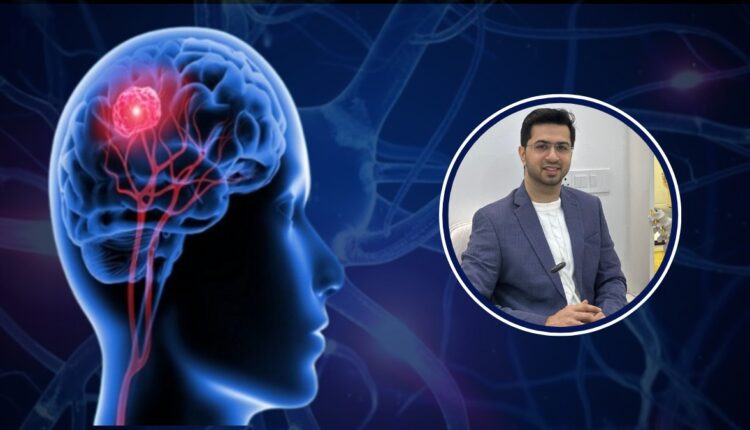World Brain Tumour Day is observed each year on June 8. The reason behind observing the day is to raise awareness among people about the disease.
Brain tumours claim thousands in India every year
According to the Indian Council of Medical Research (ICMR), around 40,000–50,000 people are diagnosed with the disease each year. It comprises 2 percent of all cancers. Due to the disease, over 24,000 people die annually.
News 24 speaks to Dr. Puneet Malik, Brain, Spine, and Nerve Specialist, Senior Consultant – Yashoda Super Speciality Hospital, Ghaziabad. Dr. Malik shares his expert insights about public awareness and timely diagnosis to reduce the chances of mortality. In the conversation, he talks about how a health-conscious lifestyle can also reduce overall cancer risk.
Here are the excerpts from the interview…
Q- What are the early warning signs and symptoms of a brain tumour that people in India should not ignore?
A- Early warning signs and symptoms of a brain tumor can vary based on the tumor’s size, location, and growth rate. However, some general early symptoms may include persistent or worsening headache especially worse in morning, associated with nausea and vomiting, focal or generalised seizures, personality changes, memory disturbances, blurring of vision, difficulty in walking, balancing and coordination, speech disturbances, weakness of one side/one limb/ facial weakness.
Q- How can increased public awareness and timely diagnosis help reduce the mortality rate, given that nearly 24,000 Indians lose their lives to brain tumours each year?
A- Early diagnosis of a brain tumor significantly reduces mortality rates by enabling timely and targeted intervention, which can improve both survival and quality of life. Tumors detected early are often smaller and localized, making surgical removal or radiation therapy more effective. Early intervention helps prevent irreversible damage to areas controlling speech, movement, vision, or memory. Early-stage tumors may respond better to surgery, chemotherapy, or radiotherapy. Studies show that early detection is associated with longer survival, especially for lower-grade gliomas, meningiomas, and some metastatic tumors. Non-cancerous tumors like meningiomas or pituitary adenomas can often be completely removed or managed with non-invasive therapies if found early. Early diagnosis reduces caregiver burden, long-term disability, and healthcare costs.
Q- What steps can individuals take to minimise their risk of developing brain tumours, and how important is lifestyle in prevention?
A- While not all brain tumors are preventable (many have unknown or non-modifiable causes), a health-conscious lifestyle plays a valuable role in reducing overall cancer risk and promoting brain health. Avoid unnecessary CT scans or X-rays, especially in children. Minimise contact with pesticides, solvents, and heavy metals. Use personal protective equipment (PPE) if working in high-risk industries (e.g., agriculture, chemical plants). Emphasize fruits, vegetables, whole grains, nuts, and omega-3 fats. Avoid processed meats, refined sugars, and excessive red meat. Antioxidants (e.g., vitamins C and E) may protect brain cells from damage. Aim for 150+ minutes/week of moderate aerobic exercise. Avoid Smoking and Excessive Alcohol. Prioritize 7–9 hours of sleep per night to allow brain detoxification. Consider genetic counseling if there’s a strong family history.
Q- Why is regular neurological screening crucial, especially for high-risk groups, and how accessible are such services across urban and rural India?
A- Regular neurological screening for brain tumors is crucial, especially for high-risk groups, because of the aggressive nature of some tumors and the significant impact on cognitive and motor functions even at early stages. Early detection increases the chances of surgical removal, reduces complications, and improves survival rates—especially for low-grade gliomas and meningiomas. Regular screening is especially crucial for People with genetic conditions like Neurofibromatosis (NF1/NF2), Li-Fraumeni syndrome, or tuberous sclerosis. Those with a family history of brain tumors. Patients with prior exposure to radiation, especially during childhood. Individuals with compromised immunity (e.g., HIV-positive or organ transplant recipients). Occupational exposure (e.g., petrochemical or industrial workers with long-term radiation/chemical contact). Early intervention means less invasive surgeries, reduced risk of cognitive and motor impairment, and a better chance at preserving normal life functions.
Rural Areas have Limited access to imaging—CT or MRI machines are scarce or nonexistent. No local neurospecialists; referral pathways are unclear or poorly funded.
Lack of awareness—symptoms often misattributed to general conditions like migraines or psychological issues. Delays of weeks to months for proper diagnosis, especially if travel to tertiary centers is needed.
Q- How can World Brain Tumour Day drive stronger health policies and community engagement to address the rising burden of brain tumours in India?
A- Brain Tumor Day, if leveraged well, can Push policymakers to recognize brain tumors as a public health priority, Educate the masses, particularly in rural India, on early warning signs, Generate momentum for better funding, screening, and treatment programs and Foster solidarity and reduce stigma around neuro-oncological conditions.

